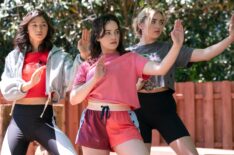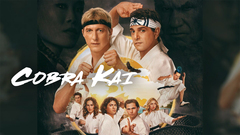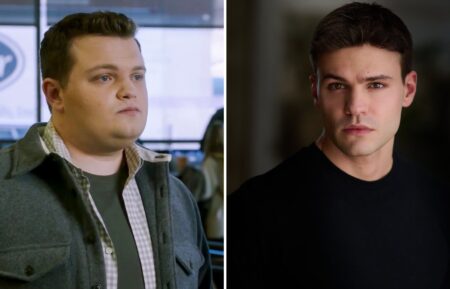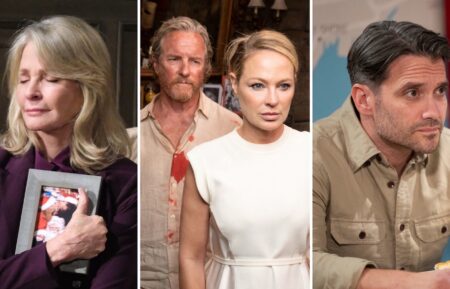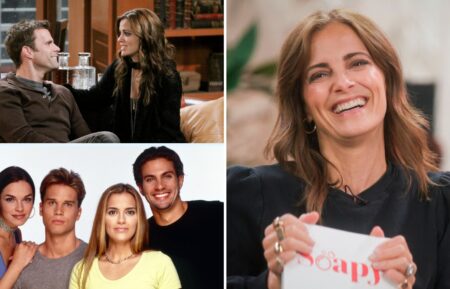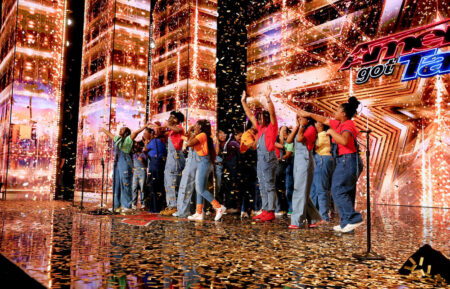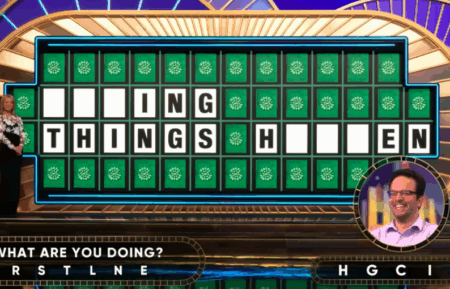‘Cobra Kai’ Bosses Break Down Season 6 Drama, Tease New Fighting Styles Ahead in World Tournament
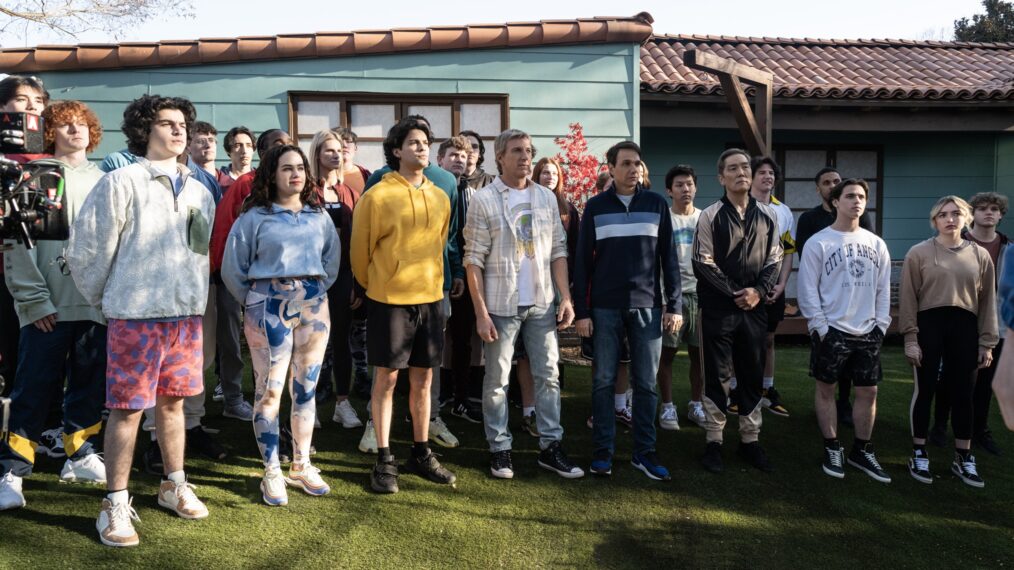
Spoiler Alert
[Warning: The following post contains MAJOR spoilers about Cobra Season 6’s first five episodes.]
The kids are not all right, but they are in Barcelona trying to make a go of it at the Sakei Taikai — some of them anyway. After a contentious first third to the final season of Cobra Kai, peacetime is pretty much over for the Miyagi-Do family, but they’ll have to get along long enough to make it through the world tournament, at least.
Daniel LaRusso (Ralph Macchio) and Johnny Lawrence (William Zabka) are on the outs again after joining dojos, and Tori (Peyton List) has now defected to Kreese’s (Martin Kove) team after losing her mother and having her determinative fight against Sam (Mary Mouser) cut short. Not only does this put her at odds with Sam, who she’s been tip-toeing around all season to make nice, but it also puts her on the opposite team from her beau Robby (Tanner Buchanan). Even Miguel’s (Xolo Maridueña) detente with Robby is in jeopardy because they both desperately need the win for their respective futures.
With the weight of the literal world on their shoulders, things are only going to get more interesting here as Cobra Kai‘s final season continues with Part 2 in November and Part 3 in 2025.
To break down Season 6 Part 1, TV Insider caught up with series creators Jon Hurwitz, Josh Heald, and Hayden Schlossberg — who also write and direct for the series — who talked about both what we saw and what’s ahead for the second stretch of Cobra Kai‘s final bow.
In the first five episodes of this season, the show digs into Mr. Miyagi’s background in a new way. What went into the decision to kind of explore his legacy in such a complicated manner?
Jon Hurwitz: I think it starts with Daniel LaRusso, and that relationship between Daniel and Miyagi was the most important from 1984 on. And when bringing the show back, we wanted that relationship to continue to be a huge part of Daniel’s life. It’s the parent who was deceased, in a sense, somebody whose impact you feel for the rest of your life. What do you do when he isn’t there to guide you in the ways he did in the past? And that was sort of where we started the series, and as we’re bringing it home, our thought was to humanize Miyagi in the biggest way possible and elevate Daniel’s relationship with Miyagi to be a little bit more mature in certain ways.
Instead of viewing him simply as the god-like figure who could do no wrong, there’s a lot about Mr. Miyagi’s life that we don’t know. Every person makes mistakes in their lives, from Johnny Lawrence to Daniel LaRusso, in different ways. So for Daniel to uncover a box that is under the floorboards of Miyagi’s place that has things in there that maybe he was never intended to see, it felt like something really interesting for Daniel to be wrestling with over the course of the season.
And I’ll just say Mr. Miyagi is a character that we love. Robert Mark Kamen, who wrote the original Karate Kid, said Miyagi is his favorite character of all time. So we like the idea of digging deeper into Miyagi here, and who knows if down the road, we get to dig deeper into Miyagi. Going forward, we’ll see.
With Miyagi, that discovery has such an impact on Daniel, but Johnny kind of takes advantage of that and causes a rift between them after things have just become peaceful. Is there any chance for them to ever have full, lasting reconciliation, or are these characters just always going to be oil and water?
Josh Heald: I don’t know. I mean, you’ll have to wait and see to answer that ultimate question. But the Johnny-Daniel rivalry and their relationship and their occasional friendship is the beating heart of the franchise and the series at this point. We can play some gamesmanship in the writers’ room — how to pull these guys apart or push them together — but ultimately, we’re dealing with two different archetypes of human being, and we try to be honest with that as well. And one of the most honest things we could do is to kind of look at who these guys are, and the absence of rivalry and the absence of a karate war, and what their personal stakes are.
And Johnny has a lot more riding on the events and the outcome of this Sakei Taikai than Daniel does on paper. He has a lot of hopes and dreams that feel unachievable in the absence of karate success, whereas Daniel feels like he’s already made it to the mountaintop, and he’s going to be fine. But, as always, there’s perspective from the outside and there’s perspective from the inside, and Daniel is clearly going through his own tumultuous internal struggle as it relates to his identity and his mentorship.
So these guys very naturally fall back into the rhythm of, “I hate you. I don’t want to see you again, except for this short, little karate thing we got to do.” And it gave us a great point of conflict to set these two on fire again. And you’ll have to wait and see where we go with that, whether we let that fire burn or if there’s anything that can come along to quelch it.
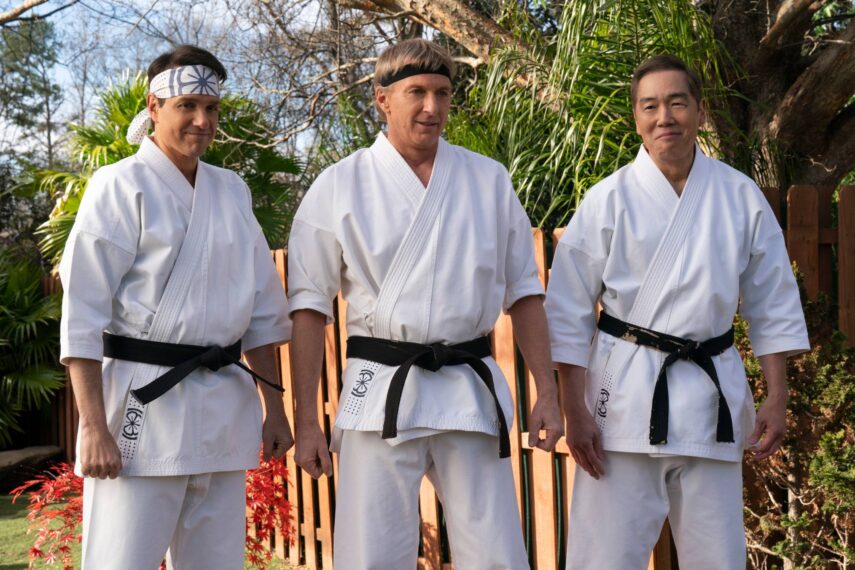
Netflix
On a similar note, Tory finds out her mother is dead, which makes this all she has now. Can you talk about Peyton List’s performance and what can we expect from her now that she’s on Kreese’s team?
Schlossberg: Peyton List did an amazing job in Season 6 with her portrayal of Tory. We purposely put her character through a lot of trials and tribulations, partly because this is a character who we introduced in Season 2 and into Season 3 as a real antagonist to Sam LaRusso. She did bad things to her, and in a lot of ways, it’s come back to haunt her, but she’s learned a lot along the way. And you’re invested in the relationships that Tory has, so the audience is gradually being in her shoes and understanding what she’s going through.
So by the time we’re in Season 6, and she has some of her most difficult challenges that have been thrown at her, you’re really hopeful that she’s going to go down the right path. And I’ll just say, Peyton List had to play one of the more complex performances that one of our teens have had to play in terms of big, emotional, gut-wrenching scenes. And she knocked it out of the park.
When it comes to the Barcelona trip, selecting the teams also meant that you guys had to whittle down the cast. What went into some of those decisions, like bringing Dimitri and Hawk but not others?
Hurwitz: Well, it started from a place of creating conflict in the first five episodes, and going from there, it makes it a lot easier for our kids to get along. So you wanted there to be some conflict and for there to be some choices. Putting those limitations on ourselves, it helped the story, but it also was fun and figuring out, okay, who’s going to be there? There’s the core four of Miguel and Robbie and Sam and Tory. And we in the audience assumed that we’d all end up going. We knew what we were doing with Tory’s story. So we knew that there was going to be an open slot there. So we knew that there were really three more there, and it was for those characters.
Episode 4 was so much fun to write because it was about the characters that were on the bubble. So it was Kenny [Dallas Dupree Young] and Anthony [Griffin Santopietro] and Devon [Oona O’Brien] and Hawk [Jacob Bertrand] and Dimitri [Gianni Decenzo], those characters, and sort of following them there, with Hawk being the — you assume Hawk’s in there, he’s the All Valley winner last year, and he’s such a great fighter. So to put them on the journey that we did, to make Hawk not originally make it, and for Devon to make it in the way that she did was a choice. And then when Tory switched sides, Hawk had his way in there, but he didn’t get in with smooth saying like he expected to, and with greater struggle than he and Dmitri have had in a while. So it was, you get all the action figures in the writers’ room, and you’re having them fight it out, and you’re just trying to do things that are unpredictable but also make sense.

Netflix
Talking about that episode, one of the funniest parts of the show was obviously the accident during the woods challenge. So can you talk about striking that balance even at this stage in the game where when things are starting to get really pretty serious, you always manage to find those comedic little buffers?
Heald: We can’t help ourselves. We are comedy writers first, and karate drama writers second. So those moments come naturally to us. And from many banks are tamping down, they’re ridiculous. We have a lot of fun in the writer’s room. You know, we talk about, ad nauseam, so you have a lot of comic relief that comes up with a storyline or a line of dialogue that you don’t honestly, and yet, the more we talked about it, the more it felt both sophomoric and yet surprising in terms of who did it and it and it gave us a lot of dramatic momentum, actually.
So the more you kind of look at a joke, at something that’s now toilet humor, and you’re getting actual story and character growth out of it, that’s A+ stuff right there. So we really wanted to be able to use a moment like that to illustrate just how much pressure these kids are putting on themselves and the lengths that they’ll go to that might seem out of character to earn that coveted spot. Because that’s not dissimilar to what a lot of kids go through in competitive sports and academics and in a competitive environment that feels like somebody who’s earned a spot for something just doesn’t get it just because of the amount of spots that are available. So yeah, we were very much within all of our wheelhouses there.
Yeah, another comedy moment from the season is Johnny Lawrence’s Slumber Party idea. At some points, it felt like an SNL skit almost but also elevated his storyline as he attempts fatherhood.
Schlossberg: Exactly. Yeah, we knew one of the sources of comedy that we wanted to explore was with Johnny becoming a girl dad and his thoughts on that. The closest way to test that is with the female students in the dojo, who are going through an interesting problem where they’re afraid to have conflict because of all the history that they have. So it was fun to have Johnny play that role of trying to goad them into going at each other. And the idea of a slumber party just felt like — we love putting him into different situations that you would never expect him in, and it just led to a lot of comedy. Ralph did a great job with that episode. It was really challenging, I could tell you. We didn’t have a lot of time to shoot, and he got a lot in the montages there what that Johnny Lawrence slumber party would be.
What else can you tease about the second leg of Season 6?
Hurwitz: We can’t wait for people to see it. I’ll just say that we’ve been talking about the idea of a world tournament for a while in the writers’ room, and we started teeing it up in Season 5, and just sort of the technical of it is really exciting for us.
You’ve seen All Valley tournaments dating back to 1984, and you’ve seen a couple on our show. And this was us being able to create a whole different type of tournament with not only characters in the Valley, but to create dojos from all over the world. I mean, just the job our costume designer Frank Helmer did with 16 different dojos is something to marvel at there, but to take the competition up enough, the character Kwon, whose martial arts skills are pretty intense — Brandon H. Lee is a world champion, the guy we cast, and we have more world-class fighters fighting in the middle five and different kinds of events.
The kinds of fighting are different than what you’ve seen in the All Valley, so there’s a lot of fun there. But beyond that, being in Barcelona — and we filmed in Barcelona for a part of it — and the drama that happens on and off the mat is really fun, and it’s great to be in a different backdrop.
Where does the upcoming Karate Kid movie fit into the timeline, do you know?
Heald: We don’t know… It’s kind of like how the Jackie Chan-Jaden Smith movie existed between the original franchise and Cobra Kai. They’re making another movie with Jackie Chan, and Daniel LaRusso factors into it, which, for us, is exciting, but we didn’t write anything directly toward that movie, nor do I believe they’re doing anything that is inspired directly from what we’re doing. Timeline-wise, I do believe it takes place in the present day, whereas Cobra Kai, technically, is a few years back.
Cobra Kai, Season 6 Part 1, streaming, Netflix

